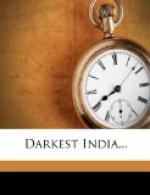By leaving these destitute classes in their present miserable condition, we prepare for ourselves a gigantic and impossible task when the evil day of famine at last overtakes us. By facing the difficulty at the outset, and meeting it midway, we make our task much easier. Time is in our favour. True, the people are hungry, but they are not dying. We can afford to let them drift a few weeks, months, or even years longer, while we are putting our heads and hearts together to devise for them some way of deliverance commensurate with the immensity of their needs. But to resign oneself to the present condition of things as inevitable seems to me almost as heartless as to fold our hands helplessly at a time of absolute famine. To deafen our ears to the immediate distresses of the submerged tenth may be less criminal in degree but not in kind.
To those who feel paralysed by the vastness of the problem I would say “Study General Booth’s Way Out and the adaptation of it to India which I have endeavoured to sketch in the following pages.”
Here at least is a plan, perhaps not a perfect one, but still definite, tangible and immediately possible. Improve upon it as much as you like. Help us to remedy its defects by all means. But whatever you do, don’t stand by as an indifferent spectator. Put your own individual shoulder to the wheel. Help us with your sympathy, prayers and substance to make the effort, and should failure ensue, you will at least have the satisfaction of realising that you have helped others to make an honest determined effort for dealing with a gigantic evil that involves the welfare, if not the existence of millions.
CHAPTER X.
THE LAND OF PESTILENCES.
Happily a description of English destitution does not call for any reference to plagues, such as those which annually or at least periodically, devastate India, and that with such certainty that their presence has come to be regarded, almost with indifference, as a matter of course, or at least of necessity. Indeed we suppose that some would even look upon it as a Divinely ordained method for reducing the population. True, that in Europe the matter is regarded in a very different light. Public opinion has made its voice heard. Medical science has exerted itself, and not in vain. The laws of sanitation are better known, and are enforced upon the entire community by severe legal enactments. And above all, Christianity has taught the rich to say of the poor “He is my brother,” and to provide for him the medical care and attention that would otherwise not be within his reach.
What is possible in Europe is no doubt possible in India. Much has already been done, and our Government is fully awake to the importance of the subject, and will be able, year by year, to institute further improvements in this respect.
With this, however, we are not directly concerned. My object in referring to the subject is to point out—




